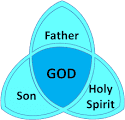 Christians generally claim that they base their beliefs on the Bible. What about the church teaching of the doctrine of the Trinity? Is that based on the Bible?
Christians generally claim that they base their beliefs on the Bible. What about the church teaching of the doctrine of the Trinity? Is that based on the Bible?
For the first three centuries of Christianity, no one had ever heard of the doctrine of the Trinity. That’s because there wasn’t any. Oh, you can go back to church father Tertullian, who was a lawyer and not really a churchman. Some Christians think he taught the doctrine of the Trinity. But that’s not right. He was the first known to use the word trinitas but merely said the Father was Almighty God and Jesus and the Holy Spirit were also divine, but of a lesser divinity.
 That is not the doctrine of the Trinity that the Catholic Church made official at its Second Ecumenical Council, held in Constantinople in 381. It means that the Father, Jesus the Son, and the Holy Spirit are all equally God. And that council took the Nicene Creed, which had been drafted at the First Ecumenical Council, held at Nicea in 325, deleted part of it and altered some of what remained. Yet neither the Nicene Creed nor the later Constantinople Creed included the word “Trinity.” The main thing was the Nicene Creed declared that Jesus was “very God of very God.” It also pronounced multiple anathemas (condemnations to hell) upon anyone who said otherwise.
That is not the doctrine of the Trinity that the Catholic Church made official at its Second Ecumenical Council, held in Constantinople in 381. It means that the Father, Jesus the Son, and the Holy Spirit are all equally God. And that council took the Nicene Creed, which had been drafted at the First Ecumenical Council, held at Nicea in 325, deleted part of it and altered some of what remained. Yet neither the Nicene Creed nor the later Constantinople Creed included the word “Trinity.” The main thing was the Nicene Creed declared that Jesus was “very God of very God.” It also pronounced multiple anathemas (condemnations to hell) upon anyone who said otherwise.
That second creed didn’t have the word “Trinity” because it is not in the Bible, and those drafters knew it. And like I said, Christians like to say that they base their beliefs on the Bible. Well then, let’s consider some other words or phrases Trinitarians use to describe such belief. How about the popular phrase “the deity of Christ”? That’s not in the Bible either. Or what about “God the Son”? Nope!
Oh, here’s a big one. Most Trinitarians say Jesus claimed to be God. Oh yeah! Where is that in the Bible? Interestingly, C. S. Lewis in his mega-selling book Mere Christianity and Josh McDowell in his More than a Carpenter (and I think in two Evidence books also) repeatedly assert Jesus claimed to be God without citing biblical evidence of it. Folks, that is pretty shabby teaching. If you’re going to make some declaration like that, which I think is the most important self-declaration ever made in the world since Jesus is the most famous person who ever lived–you better back it up with that book on which you claim to base your beliefs.
Some Trinitarians who know their Bible fairly well do so by saying, “Jesus claimed to be God in John 10.30.” Well, what did he say. He said, “The Father and I are one.”
I was a Trinitarian Christian for twenty-two years, from age eighteen to age forty. All that time I was a pretty serious student of the Bible. For most of those years, I also had Christian ministry. I co-founded the PGA Tour Bible Study (which thrives today with several spawned ministries) in my second year on the PGA Tour, in 1965. Thereafter, I gave leadership to the group. For those first twenty years in which I believed in the doctrine of the Trinity, I never doubted it. I just did like most Christians do–I accepted what my teachers, such as pastors, had taught me. Almost all Christians believe it. You just naturally think it must be right since almost all Christians believe it.
Then one day in my study, I had a moment of enlightenment while reading Jesus’ Olivet Discourse in Matthew 24 (also in Mark 13 and Luke 21). I read Jesus’ statement about his yet future return with his glorious kingdom, saying, “But about that day and hour no one knows, neither the angels of heaven, nor the Son [referring to himself], but only the Father” (Matt. 24.36). I knew that discourse, and that particular statement, well. For twenty years I had specialized in the study of biblical prophecy because of a prayer promise I made to God in a prayer group when I was eighteen years old.
Now, like many Trinitarians, I also had been taught “the hypostatic union of Christ.” It means Jesus had two natures: a human nature and a divine nature. And I was taught that when we read about Jesus in the four New Testament gospels about some act that Jesus did or something he said, he did that or said that from the source of one of his two natures, either his human nature or his divine nature. For example, when Jesus said on the cross, “I thirst,” he said that from the perspective of his human nature. But when Jesus healed someone, he did that from the source of his divine nature.
However, just as with “the Trinity,” “the deity of Christ,” and “God the Son,” there is no such thing about “the hypostatic union of Christ” in the Bible. But I don’t mean only this language, but it’s teaching as well. Moreover, there isn’t even anything in the Bible that says Jesus had two natures, let alone identifying them as human and divine. All of these beliefs and their language were created by men who lived many years after Jesus lived here, after the apostolic age, and after the first century.
So, when I read that saying of Jesus in his Olivet Discourse–that he did not know the time of his yet future return–I exclaimed to myself out loud, alone in my study room, “That makes Jesus look like a liar. He said he didn’t know, but according to the hypostatic union he did know because he is God.” I pondered that a few minutes and then said again to myself, “Not going there anymore! I will stand on the integrity of Jesus. I must look into this.”
And did I ever. To begin what I eventually called “my quest for the real Jesus,” I thought the most important thing to do, thus the place to start my quest, was to read what Jesus said about himself in the NT gospels. So, I bought a red letter NT (all of Jesus’ sayings are in red). I was shocked when I finished reading them to discover that Jesus never said he was God.
Until that time, if someone would have asked me why I believed Jesus was God, I probably would have answered, “He said so in John 10.30, ‘I and the Father are one.'” But a close examination of its prior context shows that Jesus was merely explaining that he and the Father were united in their mission of making disciples (vv. 27-29), 36), and in the subsequent context he answered the Jews’ charge of “making yourself God” by saying he only claimed to be “God’s Son” (vv. 33, 36).
But after reading that red letter Bible I said to myself concerning Jesus’ saying in John 10.31, “If that’s the strongest evidence we Trinitarians have for proving that Jesus claimed to be God, the case looks pretty weak.”
The next thing I did in the beginning of my quest for the real Jesus was that I decided the second most important thing to do is to read in the Bible what the first Christians said about Jesus identity. That would be, first and foremost, the book of Acts. It tells about many acts of the apostles, especially Peter and Paul, in their efforts to spread the gospel–the good news about Jesus. What was that good news? It sure wasn’t that Jesus is God. What! If Jesus was and is God, there wouldn’t be anything more important to tell the world about him than that! Folks, there is nothing in there about it.
In fact, it’s just the opposite. Those apostles of Jesus tell about him being a man through whom God revealed himself par excellence. For example, Peter preached his first evangelistic sermon, on the Day of Pentecost, proclaiming to Jews in Jerusalem, “Jesus of Nazareth, a man attested to you by God with deeds of power, wonders, and signs that God did through him among you, as you yourselves know–this man, handed over to you by the definite plan and foreknowledge of God, you crucified and killed by the hands of those outside the law [Gentile Romans]. But God raised him up” (Acts 2.22-24).
Notice that in this sermon Peter here twice calls Jesus a “man” and never God. And he says Jesus did all of his miracles by the power of God that was given to him, not by a supposed divine nature that constituted his very being. In fact, Luke has recorded over twenty evangelistic sermons or summaries of them in his book of Acts that were delivered to people by these first Christians, and nowhere therein it is said that Jesus is God. This is a glaring omission if Jesus was God.
Moreover, I think it impossible for Luke not to have recorded something about opposition from Jews if the apostles had proclaimed that Jesus was God since Jews were defined mostly by their unique practice of worshipping only one God and believing that he is the only God and creator of the universe. Saying Jesus was also God along with God the Father could not have escaped the charge of believing in two Gods.
Soon after this we read in Acts that God healed someone through Peter’s proclamation (Acts 3). Then the religious authorities arrested Peter and John for preaching Jesus to him and the people (Acts 4). They warned them not to preach anymore “in this name” (v. 17). “But Peter and John answered them, ‘Whether it is right in God’s sight to listen to you rather than God, you must judge'” (v. 19).
I look at that nowadays and think of whether it was right for me to listen to church fathers, and the church ever since, or believe the Bible about whether or not Jesus is God, or God is three persons, if there is a difference between these two. I think there is and that I was right in deciding that I must reject what church fathers say about that and believe the Bible.
For the next twenty-eight years, from 1980 to 2008, I estimate that I read about a thousand books on the identity of Jesus, most of them written by reputable scholars. And I went to libraries all over the U.S., looking at hundreds and hundreds of Bible commentaries, scouring the dozens of critical biblical texts to see what those experts said about them.
Then, in 2008, I self-published my writings on this subject. It is a 600-page book, The Restitution of Jesus Christ (available for now only at kermitzarley.com), wherein I cite over 400 scholars. Not only didn’t Jesus claim to be God, but nowhere in the original languages of the Bible does it say Jesus is God, and neither does it say God is three persons.
Of course, I realize that most Christians do not have the capacity or energy to do any kind of investigation about these matters as I did. Yet I believe every Christian should look into this matter somewhat for themselves. It is especially so since those church fathers in the fourth and fifth centuries laid down these teachings that are still foundational today, and they declared that anyone who rejects them is not a Christian. I say that is the teaching of men and not of God.
Raymond E. Brown was one of my favorite New Testament scholars who wrote many books and NT commentaries. He was a Roman Catholic. Time magazine claimed he was the preeminent NT scholar of the second half of the twentieth century in the world. I quote him in my book as follows, “Christian believers whose spiritual lives should be shaped by the Master, if they have not wrestled in some mature way with the identity of Jesus, are in danger of constructing a fictional Jesus … most people answer the question of the identity of Jesus without any real struggle to gain precision about what the NT says…. Christology is so important an issue for religious adherence that one should not express judgments without seriously looking at the evidence.”[1]
[1] Raymond E. Brown, An Introduction to New Testament Christology (New York: Paulist, 1994), vi, 10-11.
………………
To see a list of titles of 130+ posts (2-3 pages) that are about Jesus not being God in the Bible, with a few about God not being a Trinity, at Kermit Zarley Blog click “Chistology” in the header bar. Most are condensations of my book, The Restitution of Jesus Christ. See my website servetustheevangelical.com, which is all about this book, with reviews, etc. Learn about my books and purchase them at kermitzarley.com.













